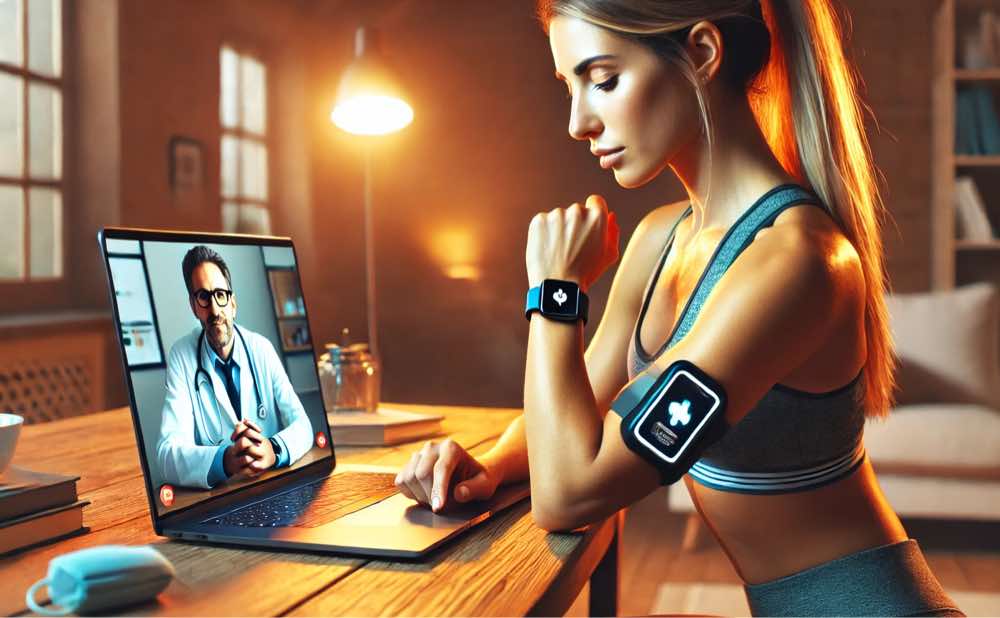Devices Plus Data: How Tech Is Transforming Healthcare

Technology has revolutionized nearly every industry, and healthcare is no exception. Over the past decade, the integration of technology into healthcare has transformed how we diagnose, treat, and manage health conditions.
From telemedicine to wearable devices, health-tech innovations are not only improving patient outcomes but also making healthcare more accessible and efficient.
This article explores how technology is impacting healthcare and highlights some significant health-tech trends.
Wearable Devices
Wearable devices have become increasingly popular as consumers seek to take control of their health and wellness. These devices, which include fitness trackers, smartwatches, and even wearable ECG monitors, allow users to monitor their heart rate, physical activity, and sleep patterns in real-time.
The data collected by wearable devices is not only useful for individuals looking to maintain a healthy lifestyle but also for healthcare providers who can use this information to make more informed decisions about patient care. For example, a wearable ECG monitor can detect irregular heart rhythms and alert both the patient and their healthcare provider, potentially preventing a serious cardiac event.
As wearable technology continues to advance, we’re seeing the development of more sophisticated devices capable of monitoring a broader range of health metrics. For instance, wearable glucose monitors for diabetic patients provide continuous glucose readings, allowing for better management of blood sugar levels. Similarly, wearable blood pressure monitors offer a convenient way to track and manage hypertension.
Big Data Analytics
The healthcare industry generates an enormous amount of data, from wearable devices, patient records, and clinical trial results. Big data analytics is enabling healthcare providers to harness this data to gain actionable insights that can improve patient care and outcomes.
One of the key benefits of big data analytics in healthcare is predictive analytics, which uses historical data to predict future events. For example, predictive analytics can help identify patients at risk of developing chronic conditions like diabetes or heart disease, allowing for early intervention and preventive care.
Big data analytics is also being used to optimize hospital operations, such as reducing wait times and improving resource allocation. By analyzing data on patient flow, staffing levels, and treatment outcomes, healthcare providers can make more informed decisions that enhance efficiency and patient satisfaction.
AI-Powered Diagnosis and Treatment
Artificial intelligence is playing an increasingly significant role in healthcare, particularly in the areas of diagnosis and treatment. AI algorithms can analyze vast amounts of data from medical records, imaging studies, and other sources to identify patterns and make predictions that can aid in diagnosis and treatment.
AI is being used to increase the accuracy and speed of medical diagnosis. One exciting application is in medical imaging. AI-powered tools can analyze images from X-rays, MRIs, and CT scans with remarkable accuracy, often detecting abnormalities that would be missed by a highly trained physician. This technology is particularly valuable in fields like oncology, where the early detection of cancer can significantly improve outcomes.
AI is also being used to develop personalized treatment plans based on a patient’s unique genetic makeup, lifestyle, and medical history. By analyzing a patient’s health and lifestyle data, AI can help healthcare providers identify effective treatments for individual patients, minimizing trial and error and reducing the risk of side effects and adverse reactions.
In addition to diagnosis and treatment, AI is also being used to enhance drug discovery by analyzing biological data to identify potential drug candidates. This approach has the potential to speed up the development of new therapies and bring life-saving drugs to market more quickly.
Telemedicine
One of the most notable ways technology has disrupted healthcare is through the rise of telemedicine. Telemedicine allows patients to consult with healthcare providers remotely via video calls, phone calls, or even text messages. This trend gained significant traction during the COVID-19 pandemic, when in-person visits were limited, but it has since become a permanent fixture in the healthcare landscape.
Around the world, telemedicine is bridging gaps in healthcare access, especially in underserved and rural regions. In the United States, platforms like Teladoc Health and Doctor on Demand have led the charge, offering virtual consultations and remote monitoring for a wide range of medical conditions, including mental health and chronic disease management. Meanwhile, in China, Ping An Good Doctor has increased healthcare access, providing millions of users with AI-assisted virtual check-ups and consultations.
Telemedicine offers numerous other benefits, including reduced travel times, substantial cost savings, and greater convenience for both patients and providers. It also enables real-time data sharing and continuous monitoring of chronic conditions, allowing for timely interventions and improved patient management.
As telemedicine continues to evolve, we can expect to see more specialized telehealth services, such as virtual mental health consultations, remote physical therapy sessions, and robotic-assisted tele-surgery.
The bottom line
Technology is undoubtedly having a significant impact in the healthcare sector, transforming the industry in ways that were once unimaginable.
From telemedicine and wearable devices to AI and big data, health-tech trends are making healthcare more personalized, accessible, and efficient.
As these technologies continue to evolve, they hold the promise of improving patient outcomes and revolutionizing the way we approach health and wellness. For healthcare providers, patients, and tech innovators alike, the future of healthcare is bright and full of potential.
Zuhair Imaduddin is a Senior Product Manager at Wells Fargo. He previously worked at JPMorgan Chase and graduated from Cornell University.
Image: DALL-E
The post Devices Plus Data: How Tech is Transforming Healthcare first appeared on Tom Spencer.


